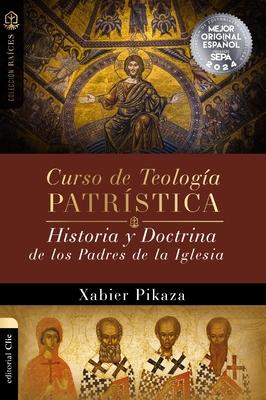Recorre la historia de la iglesia primitiva y los lderes que fueron cabeza y parte del movimiento del cristianismo, con el Curso de teologa de los padres de la iglesia, una recopilacin desde los Apstoles de Cristo hasta los Padres de la Iglesia Oriental.
Elaborado en una estructura de tiempos, el autor divide el contenido en:
- Padres apostlicos. Recoge la vida y obra de los primeros cristianos, desde el I d. C. a finales del II, llamados apostlicos y protagonista de la primera iglesia, los cuales son testigos privilegiados del surgimiento y teologa del cristianismo, que muestra desde el comienzo una gran libertad.
- Padres apologistas Obra de los primeros telogos estrictamente dichos, de finales del siglo II hasta mediados del s. III d. C., que escribieron en griego (Justino, Ireneo...), menos Tertuliano, que lo hace en latn.
- Padres alejandrinos, iglesia copta/egipcia (siglos III?IV d. C.). Fueron los primeros telogos estrictos en dilogo con el pensamiento griego (empezando por Clemente de Alejandra y Orgenes.
- Padres sirios, Iglesia oriental (siglos IV?V d. C.). Junto a los alejandrinos (y en contraste con ellos) se elevan los padres orientales, ms en concreto los de Siria.
- Padres Latinos (siglos III?VII d. C.). Estuvieron ms interesados en cuestiones de moral y de organizacin jurdico?administrativo de la Iglesia que en temas de estricta teologa o exgesis de la Biblia.
- Patrstica latina tarda (siglos VIII?XII d. C.). En sentido restringido la patrstica acaba con el despliegue del monacato celta y la reforma o renacimiento carolingio (entre el VIII y IX d. C.
- Patrstica griega tarda (siglos VIII?XIV d.C.), se sitan los ltimos Padres de la Iglesia oriental, cuya primera etapa culmina en los grandes pensadores del VII y principios del VIII (Dionisio Areopagita, Mximo, Juan Damasceno).
Course of Theology of the Church Fathers
Follow the history of the early church and the leaders who were head and part of the Christianity movement with the Course of Theology of the Church Fathers, a compilation from the Apostles of Christ to the Fathers of the Eastern Church.
- Apostolic Fathers. It gathers the life and work of the first Christians, from the first century A.D. to the end of the second century A.D., called apostolic and protagonist of the first church, who are privileged witnesses of the emergence and theology of Christianity, which shows from the beginning a great freedom.
- The work of the first theologians specifically, from the end of the second century to the middle of the third century A.D., who wrote in Greek (Justin, Irenaeus...).
- Alexandrian Fathers, Coptic/Egyptian church (3rd-4th centuries AD). They were the first strict theologians in dialogue with Greek thought (beginning with Clement of Alexandria and Origen.
- Latin "Church" Fathers (III-VII centuries A.D.). They were more interested in questions of morality and juridical-administrative organization of the Church than in matters of strict theology or exegesis of the Bible.
- Latin Fathers (III-VII centuries A.D.). They were more interested in questions of morality and juridical-administrative organization of the Church than in matters of strict theology or exegesis of the Bible.
- Late Latin Patristics (VIII-XII centuries A.D.). In a narrow sense, patristics ends with the spread of Celtic monasticism and the Carolingian reform or renaissance.
- Late Greek Patristics (VIII-XIV centuries A.D.), the last Fathers of the Eastern Church, whose first stage culminates in the great thinkers of the VII and early VIII centuries.
